1715843823-0/WhatsApp-Image-2024-05-16-at-12-14-16-(1)1715843823-0.jpeg)
The Supreme Court on Saturday -- while explaining its decision to reject the Khyber-Pakhtunkhwa advocate general’s application to live-stream the proceedings of the federal government’s intra-court appeals against its September 15 verdict that struck down amendments to the National Accountability Bureau (NAB) law -- noted that there was a real probability that the hearings might be misused or exploited for ulterior or personal purposes.
“In live-streaming cases there is always a possibility that the facility may be misused or exploited for ulterior or personal purposes. There is also the possibility of grandstanding while the nation watches. This court must be vigilant against such misuse and/or exploitation,” read a six-page written order authored by four judges, namely Chief Justice of Pakistan Qazi Faez Isa, Justice Aminuddin Khan, Justice Jamal Khan Mandokhail and Justice Hasan Azhar Rizvi.
During the May 30 hearing, the SC bench -- headed by Chief Justice of Pakistan Qazi Faez Isa and including Justices Aminuddin Khan, Athar Minallah, Jamal Khan Mandokhail, and Hasan Azhar Rizvi -- decided in a 4:1 ruling not to live-stream the proceedings. Justice Minallah was the only dissenting judge.
The order noted that when the head of a political party wants to be heard, who is not an advocate of this court, there is a real probability that these hearings may be used for political purposes and point scoring and in respect of matters which do not concern these appeals.
"This was a paramount consideration when we had dismissed the application. And, our apprehension proved correct later in the day. When Mr Niazi (Imran Khan) addressed the court on (30 May 2024) he also mentioned other cases, the general elections held on February 8, 2023, a commission of inquiry and his incarceration; all these matters have nothing to do with the subject matter of these appeals.
“This cannot be permitted as it would thwart the proper administration of justice. Commenting on matters not under consideration may affect public perception. The rights of those who are not before us, including their fundamental right to fair trial and due process may also be affected,” says the order.
The court said that while a request to live broadcast or live-stream may be submitted, and may also be objected to, it is clarified that this, as matters presently stand, “is in the exclusive domain of this court”.
The court said that the public has shown little or no interest in the matter of whether the amendments made to the National Accountability Ordinance, 1999 are sustainable on the constitutional plane, nonetheless this court, on its own volition was live-streaming the hearing of these appeals.
The court noted that 53 hearings of his petition against amendments in NAB law were held and, as per the record, Mr Niazi did not personally attend a single hearing. And, neither he, the government of Khyber-Pakhtunkhwa nor any other party requested to live broadcast/stream the hearings.
"Mr Niazi submitted that he will represent himself. Therefore, directions were issued to connect him to this Court through video-link, which was done. On 30 May 2024 Mr. Niazi requested access to counsel and that he wanted to consult with Senior Advocate Khawaja Haris Ahmad.
"We directed that whenever the said learned Senior Advocate wants to, he, along with two other lawyers, may meet Mr. Niazi with regard to these appeals. Therefore, since Mr. Niazi is now represented he need not be provided video-link facility, however, this facility is being continued", says the order.
The court further said that for the first time in its history, on 18 September 2023, the proceedings of the Supreme Court were live broadcast and then live- streamed.
Read Imran’s first interaction with CJ Isa
"Thereafter, from time to time, matters which were considered to be of public interest were live-streamed; 40 hearings have so far been live streamed. This initiative was taken to provide to the general public and lawyers throughout Pakistan direct access to the courtroom in respect of matters of public interest. The objective was manifold, including: educational, openness and transparency, forestalling misreporting or onesided reporting, facilitating lawyers on how best to articulate their propositions, how to effectively conduct cases and how to behave in the courtroom.
"There are also instances of cases which were initially live streamed but in the interest of justice it was discontinued.
"The application also does not cite any law in its support. The learned Advocate General surely must know that Article 25 of the Constitution stipulates that all citizens are equal before the law and are entitled to equal protection of law, but the application does not say how the Government of Khyber-Pakhtunkhwa is being denied equality or equal protection of law.
"Therefore, on this ground alone the said application could be dismissed, but we did not do so and have decided it on merits,” says the order.
Interesting, the four judges, who authored the judgement, failed to mention a reference of law or citation of any judgement to support their observations.
Interestingly, the same SC bench led by CJP Isa had provided narrative to the Pakistan People’s Party (PPP ) by giving legal opinion in former prime minister Zulfikar Ali Bhutto murder case. Likewise, the apex court also ended the lifetime disqualification by revisiting its earlier judgment which benefited former prime minister Nawaz Sharif before the general elections.
Former additional attorney general Waqar Rana told The Express Tribune that para 12 of the order shows that the majority ignored a basic principle, i.e., open justice. “The apprehension referred to may be seen as a denial of access to justice, knowing well that since the hearing of the original case things have wholly changed. An advocate who represented him last time is no more the counsel. The matter pertains to criminal law that affects the nation and not an individual. The court otherwise owes a duty to the public to live-stream the case as the circumstances in which law was amended made it suspicious. After all some other matters like ROs order of the Lahore High Court in hurriedly convened proceedings was streamed live when the previous decision by the whole court.”
Rana stated that political speech is the highest form of free speech.
Barrister Asad Rahim Khan said that as with almost all other landmark decisions this year, the internal consistency of this order is near zero. “This is yet another ad hoc decision that makes little use of the law.”
However, former Sindh High Court Bar Association president Salahuddin Ahmed supported the SC order. "I think it’s fine. There was really no need to allow IK to address the court in the NAB case. It’s a purely legal issue. “If you let politicians appear in person and request live telecast whenever they want, the court will become a jalsagah.”
He added, “More important case that I think should be live telecast is the reserved seats case.”

1731916090-0/sabrina-(3)1731916090-0-405x300.webp)


1732020599-0/BeFunky-collage-(73)1732020599-0-165x106.webp)
1731926127-0/zayn-(1)1731926127-0-165x106.webp)

1724319076-0/Untitled-design-(5)1724319076-0-270x192.webp)
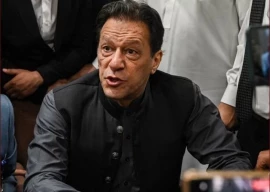



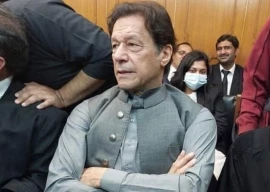
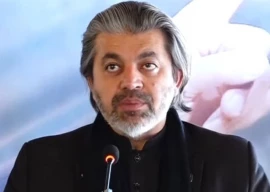
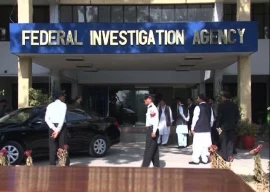
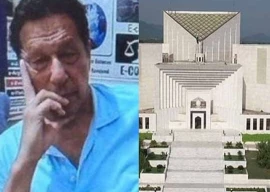






COMMENTS (1)
Comments are moderated and generally will be posted if they are on-topic and not abusive.
For more information, please see our Comments FAQ